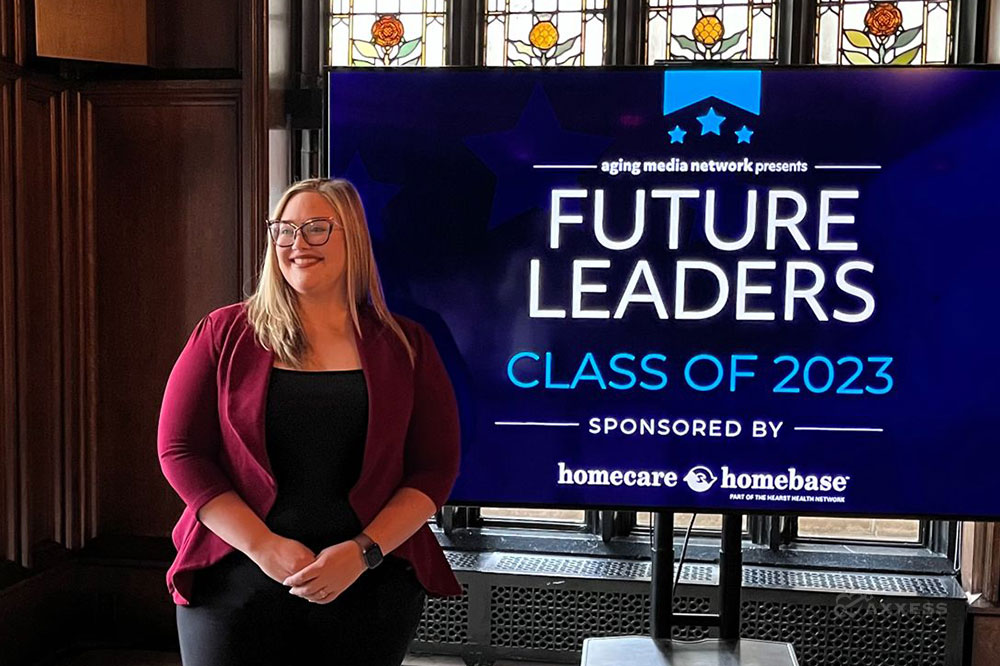
Amy Rose, Senior Director of Palliative Products for Axxess, was named a 2023 Future Leader by Hospice News.
To become a Future Leader, an individual is nominated by their peers. The candidate must be a high-performing employee who is 40 years old or younger, a passionate worker who knows how to put vision into action, and an advocate for seniors and the committed professionals who ensure their well-being.
Rose sat down with Hospice News to talk about her career trajectory and the ways the industry is evolving.
What drew you to this industry?
When I was really young, I didn’t know what I really wanted to do with my life. I ended up going and getting a massage therapy certificate, and I had to do an internship with that certificate. I chose to do mine at an inpatient hospice unit.
I walked away from that experience really just blown away by the care that the patients received, the way that the nurses approached that care and medicine. So I walked away saying, “Okay, I’m listening, I think I need to be a nurse, and this is the industry that I want to be in.”
I went through nursing school. Unfortunately, I was told, “Oh, no, don’t start your career in end-of-life care. That’s not really where you start your career. It may be where you end your career.” So I went off when I graduated nursing school and did a couple of other things.
Then I ended up having an opportunity to, interestingly enough, go and work for an inpatient hospice unit. And I just said, “Okay, this is my dream job. I don’t know if it’s too early in my career to do this, but I’m making the leap.”
I’m so grateful that I did, because I’ll never forget that first day that I walked into that inpatient unit. This is why I became a nurse, and this is the kind of medicine that I want to be delivering.
Over the years, I really found my affinity for leadership and was privileged to be able to oversee operations for not only that hospice, but the palliative industry. And then I learned and fell in love with the innovation that this industry is involved in and bringing back care in the home and how passionate I was about those concepts.
What’s the biggest lesson that you’ve learned since you’ve started working in this industry?
I have learned so many lessons.
I’m a millennial, and I grew up with a mother who worked in technology. So I really came in already very well-versed in technology and the things that technology could do for us. And particularly in the home-based care industry, I’m just seeing this gap.
Actually, it’s really across health care, this gap in leveraging technology to help our clinicians be more efficient and using it as a tool to break down barriers and help to streamline everything that goes along with health care.
One of the biggest lessons I have learned is that we have some places to go from a technology perspective in health care. And again, I wanted to be part of that, which is partly how I ended up with Axxess.
If you could change one thing with an eye toward the future of the industry, what would it be?
There’s still just so many misconceptions about care at home. I would really like to see us, as a whole, collective care at home industry, come together and really get good at educating the consumer on the strength that care at home can bring, as well as just helping to define it in a way that the consumer can understand.
There’s still just so much confusion about what home care is versus home health versus palliative care versus hospice care. The average consumer doesn’t do a great job navigating those, and I, to be honest, I don’t think that health care as a whole does a great job of navigating those.
I’d like to see that change, so that care at home is positioned a little bit more in a place that is more accessible to the everyday health care consumer.
What do you see as being different about the hospice or palliative care spaces, looking ahead to 2024?
I really see the ability to leverage the data that we have and the outcomes that we’re bringing to patients to the forefront, helping to develop payer relationships and really establish those deep connections with acute care models. That is what I see us doing differently going into 2024.
In a word, how would you describe the future of the hospice and or palliative care industry?
I think a word that works for both is “equitable.” I would really like to think that we are helping to bridge the gap to delivering person-centered care in a way that is accessible and treats all patients as humans at their core.
Helping to really protect a person’s quality of life is such a special, unique aspect of hospice and palliative care, and I see that word, “equitable,” as being the future of our industry.
What quality must all future leaders possess?
Every future leader in this industry needs to possess an incredibly deep ability to embrace innovation.
We are at a pivotal place, in our industry, to really do it very differently and so much better than how it’s been done before. For some people that weight is crushing, and for true innovators, that weight is exhilarating.
I think we should have wild dreams about the future of this industry and be willing to push boundaries and make those changes to do it in an innovative and different way.
Editorial Note: This article originally appeared on Hospice News.
